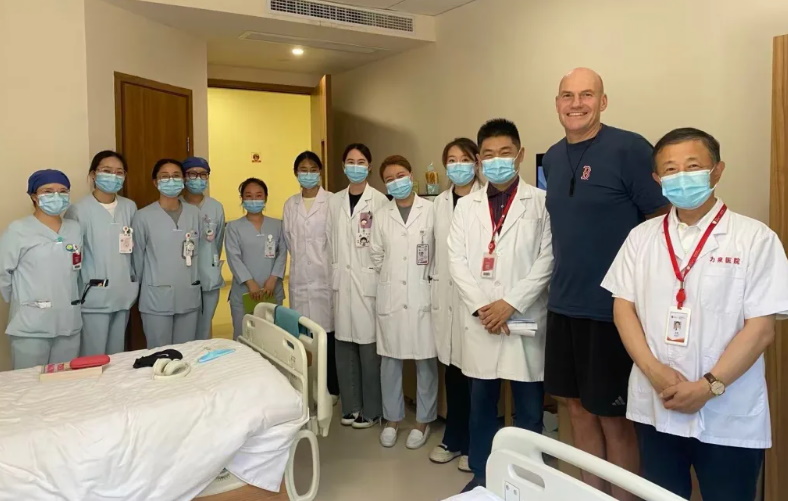Top Stories
Former Police Officer Pursues Cutting-Edge Cancer Treatment Abroad

A former police officer is among a group of New Zealand patients seeking advanced cancer treatment overseas due to increasing wait times for standard therapies at home. Stu Lye traveled to China in May 2025 to receive CAR T-cell therapy, a procedure where T cells are collected from the patient, genetically modified to target cancer cells, and then reintroduced into the body. Lye is currently aware of four other New Zealand patients undergoing treatment in China, with two recently completing their therapy and achieving complete remission.
The situation has prompted concern from New Zealand’s Minister of Health, Simeon Brown, who acknowledged that delays in accessing standard stem cell treatments, also known as bone marrow transplants, have forced some patients into palliative care. Brown stated, “This is deeply concerning for me, and I understand how stressful this is for patients and their families.” In response, Health New Zealand announced an additional $6 million investment to enhance access to these treatments, with expectations for urgent action.
Lye’s journey with cancer began in 2018 when he was diagnosed with a high-risk form of myeloma. Following three rounds of stem cell treatments in New Zealand, he resorted to using his KiwiSaver savings to cover the costs of medications not funded by Pharmac. When he relapsed this year, he faced a critical decision regarding treatment options.
“In Australia or the US, you’re looking at close to $1 million for CAR T-cell therapy, while in China it was about $150,000, making it the preferred option for me,” Lye explained. Although he lacked the full amount, he successfully fundraised to cover the costs. His experience reflects the challenges faced by many New Zealand blood cancer patients who often have to self-fund treatments or seek care abroad.
On the campaign trail, the National Party, led by Christopher Luxon, pledged to address these discrepancies, assuring blood cancer patients that they would not be neglected. Luxon emphasized the need for Kiwis to have access to better treatments domestically, aiming to provide more individuals with the opportunity to overcome cancer.
While patients like Lye are navigating lengthy wait times for standard treatments that may render them incurable, some advanced therapies remain unavailable in New Zealand. Lye received his CAR T-cell treatment at Renji Hospital in Shanghai. He had meticulously planned his treatment by consulting with a professor of haematology, who advised him to seek care upon relapse. “Within 10 days, I was in a hospital bed at Renji Hospital, and we were there for seven weeks, five of which I spent in hospital,” Lye recounted. “It was wonderful. I had a dual CAR T that has put me in complete remission. I’ve returned to New Zealand and am looking to go back to work.”
Lye advocates for collaboration between New Zealand and countries like China to access advanced treatments. He believes that New Zealand’s capacity to keep pace with international advancements in cancer care is limited due to differences in investment and research. “We need to collaborate with places like China so we can utilize their technology without having to learn it ourselves. That is probably the only way forward,” he concluded.
As the conversation around cancer treatment continues, the experiences of Lye and others highlight the urgent need for systemic changes within New Zealand’s healthcare framework, aiming to ensure that life-saving treatments are accessible to all patients in need.
-

 World3 months ago
World3 months agoTest Your Knowledge: Take the Herald’s Afternoon Quiz Today
-

 Sports3 months ago
Sports3 months agoPM Faces Backlash from Fans During Netball Trophy Ceremony
-

 Lifestyle3 months ago
Lifestyle3 months agoDunedin Designers Win Top Award at Hokonui Fashion Event
-

 Sports3 months ago
Sports3 months agoLiam Lawson Launches New Era for Racing Bulls with Strong Start
-

 Lifestyle3 months ago
Lifestyle3 months agoDisney Fan Reveals Dress Code Tips for Park Visitors
-

 World4 months ago
World4 months agoCoalition Forms to Preserve Māori Wards in Hawke’s Bay
-

 Health3 months ago
Health3 months agoWalking Faster Offers Major Health Benefits for Older Adults
-

 Politics3 months ago
Politics3 months agoScots Rally with Humor and Music to Protest Trump’s Visit
-

 Top Stories4 months ago
Top Stories4 months agoUK and India Finalize Trade Deal to Boost Economic Ties
-

 Entertainment3 months ago
Entertainment3 months agoExperience the Excitement of ‘Chief of War’ in Oʻahu
-

 World4 months ago
World4 months agoHuntly Begins Water Pipe Flushing to Resolve Brown Water Issue
-

 Science4 months ago
Science4 months agoNew Interactive Map Reveals Wairarapa Valley’s Geological Secrets









